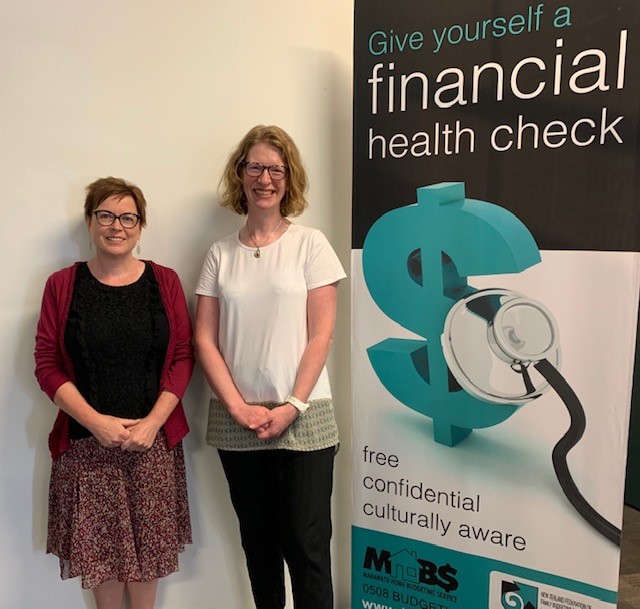
From left: Manawatu Home Budgeting Service Manager Miriam Peel and Financial Mentor Jeanette Parsons
The stress of having to pay for extra power costs for heating can be chilling for some of our most vulnerable people.
Manawatu Home Budgeting Service Financial Mentors Jeanette Parsons and Brett Cole expect to see some people run into trouble with their power bill over winter. In their experience, the more people living in one house, the harder it can be to stay on top of the power bill.
“Our clients don’t always have strategies to reduce power costs,” she says.
Some of their clients’ stories about ways to keep the power bill down include going to bed at 3pm, wrapping themselves up in blankets, or moving around the house with the sun in a bid to keep the heating turned off.
Ministry of Business, Innovation and Employment (MBIE) statistics show households spent an average of $647 on electricity from June to August in 2019. The year after this increased to $655.
Each quarter in between ranged from $429 to $552 – showing there is an increased demand for electricity in the winter months across the board. These figures include prompt payment and other types of discounts.
Jeanette says the winter months can be a stressful time for people who are worried about how they will pay for the extra power they need.
“The bill just gets away from them and they end up in trouble. The risk is if they end up too far in arrears, the power company potentially disconnect them – it can have a huge impact on them.”
People on limited incomes are the most affected, says Jeanette. Seniors (elderly) can be particularly vulnerable, as the chill can have a detrimental effect on their health.

Jeanette says there are some practical ways people can try and keep their homes warm to reduce the cost of power, like drawing the curtains as soon as it gets dark and using draught stoppers under the doors.
For people in Manawatu, Palmerston North also has a curtain bank which can help keep homes insulated through the winter.
She also urges people to build up credit with their power company where they can, or look into options like SmoothPay, which averages out power costs over a year so people pay the same amount each week.
Jeanette says as a sector, education is the key to helping people understand their finances so they don’t have to think twice about turning the heating on.
She has some concern the winter energy payment – which was doubled last year to help with the costs of COVID-19 – will see some people struggle this year without the extra payment.
“The job we do is about working with and supporting clients so they understand their finances, and so they can make educated financial decisions to benefit their lives,” says Jeanette.
Catching a cold
Seniors are another group of vulnerable people who may be feeling the heat coming up to winter.
Eldernet Director Esther Perriam says seniors can face complicated health issues when they’re not adequately heating their homes.
If they’re already managing a number of health conditions there is the possibility a small ‘chill’ or aggravating an existing condition (eg asthma) may have knock on effects and create a snowball of worsening health.
“The other impact on seniors is the psychological impact of ‘saving’ during a crisis. Often seniors will have lived through a number of events that have required them to make drastic changes, often for the ‘good’ of society,” says Esther.
“Whilst this mindset would have helped them manage these events in the past, older people now need to consider that they perhaps need to be the recipients of these savings, and not the savers.”
Esther is encouraging people who plan on reducing heating to save money to get some expert advice to see if they can save in other areas first.
If elderly people do need extra support, she urges them to get in touch with their local agencies like Age Concern, a local community centre or church or Work and Income.
The government also gives all Gold Card holders an extra payment to help with heating costs in the cooler months.
The cost of living
 We all know New Zealand has poor quality housing stock.
We all know New Zealand has poor quality housing stock.
Electricity Retailers Association New Zealand (ERANZ) representative Elizabeth Mitchell says some people struggle to keep their homes warm in winter because of a lack of insulation, single glazed windows and inefficient heating appliances.
“This along with high living costs means some people unfortunately go without heating to keep their power bill down,” she says.
ERANZ has partnered with FinCap on EnergyMate to help people who are struggling to heat their homes or afford their energy bills.
EnergyMate provides a free in-home energy assessment, coaching and community workshops to help people make the most of their electricity.
“If you’re worried about bills and heating your home in winter, call your power company. They can help you set up payment options and check you’re on the best plan for your situation,” says Elizabeth.
“Nobody wants to see families going without power or struggling to stay warm in winter. The electricity sector wants to do its part to make sure the most vulnerable families can keep warm, dry, and healthy.
“Working with other agencies, like FinCap, and connecting customers to social support services is part of the wider work that power companies do to assist customers who are experiencing energy hardship.”
FinCap believes energy is essential for health, wellbeing and social participation and nobody should be disconnected or go without power because of an inability to pay.
If you or somebody you know is struggling to pay for power and may go without heating this winter, you can get expert advice from our MoneyTalks helpline team on 0800 345 123.
